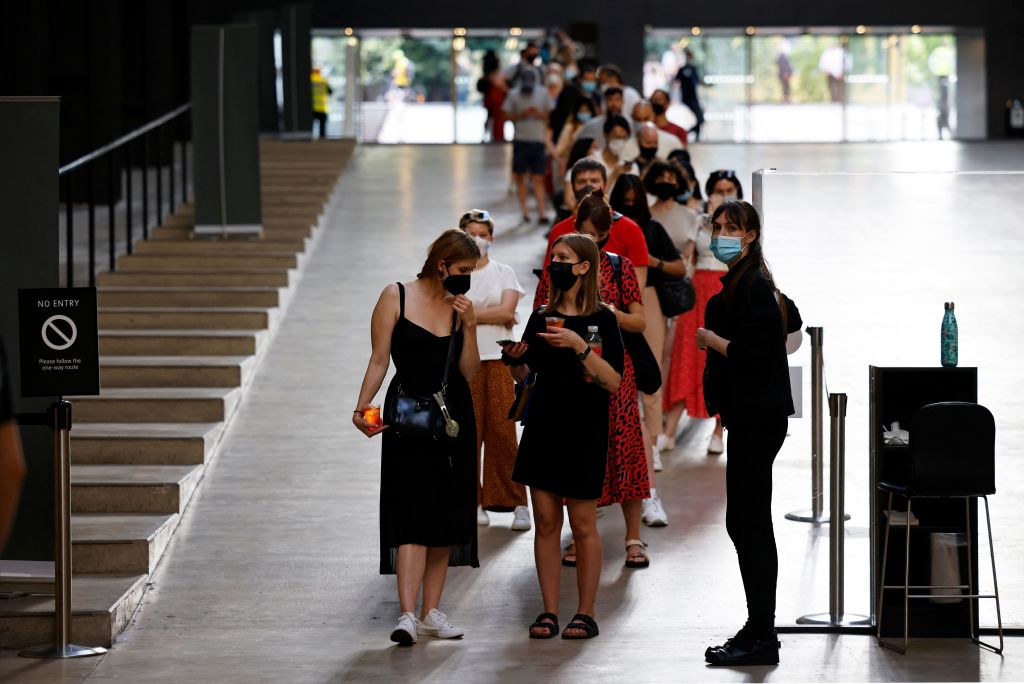Written by Amy Sedghi
Should we really be surprised you can still catch the virus after getting the jab? Stylist debunks the confusion about catching and spreading Covid-19 after you have been vaccinated.
With the pingdemic and stories circulating about the number of people who are double vaxxed and still getting Covid-19, it can feel like a lot to get your head around right now. Throw in the easing of restrictions while Covid cases are on the rise and it’s understandable that it’s all getting a bit confusing.
Last week, Health Secretary Sajid Javid announced that he’d contracted Covid-19 despite having had both doses of a vaccine. While some weren’t worried, others were left surprised and shocked. But the vaccinations never promised to be 100% effective, so why are we so taken aback when someone who’s been double jabbed then contracts Covid?
What is the likelihood of getting Covid-19 after being double vaxxed?
“I think some people, perhaps, believed a Covid vaccine would mean no Covid; not a reduced chance of getting Covid and reduced severity. However the Covid vaccine, like the flu vaccine, does not give you absolute protection,” explains Dr Lis Kilcourse, an NHS GP. “Unfortunately, in medicine, very few things are absolute and often it is about reducing risk and severity as much as it is preventing an illness. That is what the Covid vaccine is doing for us.”
Almost all double-vaccinated people in England have antibodies, according to recent findings by Imperial College London. So what does this mean exactly? Antibodies are produced by the body following infection and vaccination, and although the presence of them doesn’t necessarily prevent you contracting Covid-19, they can provide protection against becoming unwell.
New variants of the virus also pose a threat to people getting ill after vaccination, explains Sonia Khan, senior pharmacist at Medicine Direct. “New data suggests that the Johnson & Johnson vaccine is less effective against the delta variant than other vaccines such as Pfizer and Moderna. This means that if you catch a new strain of the virus, the vaccination could be less effective.”
She also points to the amount of misinformation circulating at the minute surrounding the vaccines and their efficacy, which adds to the noise and uncertainty.It’s important to remember that this the biggest vaccination programme in our lifetime, and that vaccines have never been as widely discussed as they are today, shares Khan.
Does having the vaccine affect the severity of Covid-19 illness if you do get it?
For Mollie, 26, from south London, it wasn’t a huge shock for her when she contracted Covid-19 in July, despite having had both doses of the AstraZeneca vaccine, but her family were stunned. “[Although] I thought I could still get it, I thought the chance was really low,” she says. “But my family members thought the vaccine meant you would be fine so were really shocked when I initially caught it.” As someone who has asthma, Mollie was offered the vaccine earlier and says ultimately, she’s glad she did get the vaccine: “[I] was really grateful I had it as I think my symptoms could have been way worse without it.”
“The numbers are actually really good in terms of effectiveness of the vaccine in terms of reducing disease severity and hospital admission,” says Dr Kilcourse. Knowledge about how effective they are is developing all the time, she explains, with different studies showing slightly differing results for efficacy, depending on the variant of Covid contracted.
“At present two doses of Pfizer are approximately 95% effective against symptomatic infection of the alpha variant, and 90% against delta. Two doses of AZ [AstraZeneca] are 65% effective against symptomatic infection in alpha, and 60% of delta.” They are both highly effective, she says, providing greater than 90% protection against hospital admission with both alpha and the delta variant.

How do vaccinations actually work?
Khan believes it is a lack of understanding about how the mechanics of a vaccine actually work that creates confusion for people, combined with the fact that how our bodies create immunity, and how this differs by disease, is not that straightforward. While our body can develop lifelong immunity to certain diseases, say chickenpox, for other fast-mutating infections, such as Covid-19 and the flu, regular vaccines and booster jabs are needed to ensure our level of immunity, clarifies Khan.
“No vaccine will prevent illness 100% of the time,” she says plainly, adding that there will still be a small percentage of people who will catch Covid-19 after vaccination and still get sick with symptoms. There is also a small window after vaccination in which it takes your body a few weeks to build up protection against the virus, explains Khan.
“Did you know that your immune system has a memory?” she asks, going on to explain: “Your immune system is constantly learning and constantly coming into contact with different kinds of bacteria and viruses.”
Dr Kilcourse also has a handy way of breaking it down: the Covid vaccine works by delivering antigens (normally weakened or modified versions of a virus). These antigens tell the immune system to produce a response to protect you against the illness from the antigen. The response is in the form of antibodies; so, think of these as ‘foot soldiers’ that are protecting you against a virus. This means that when you face the real antigen, your body recognises it (the ‘enemy’) quicker and can therefore produce more antibodies (more ‘soldiers’) quicker. “So, you can reduce the chance of developing a disease; or if you get the disease, it is less severe because you have been able to form a stronger defence against it,” she concludes.
Images: Getty
Source: Read Full Article
